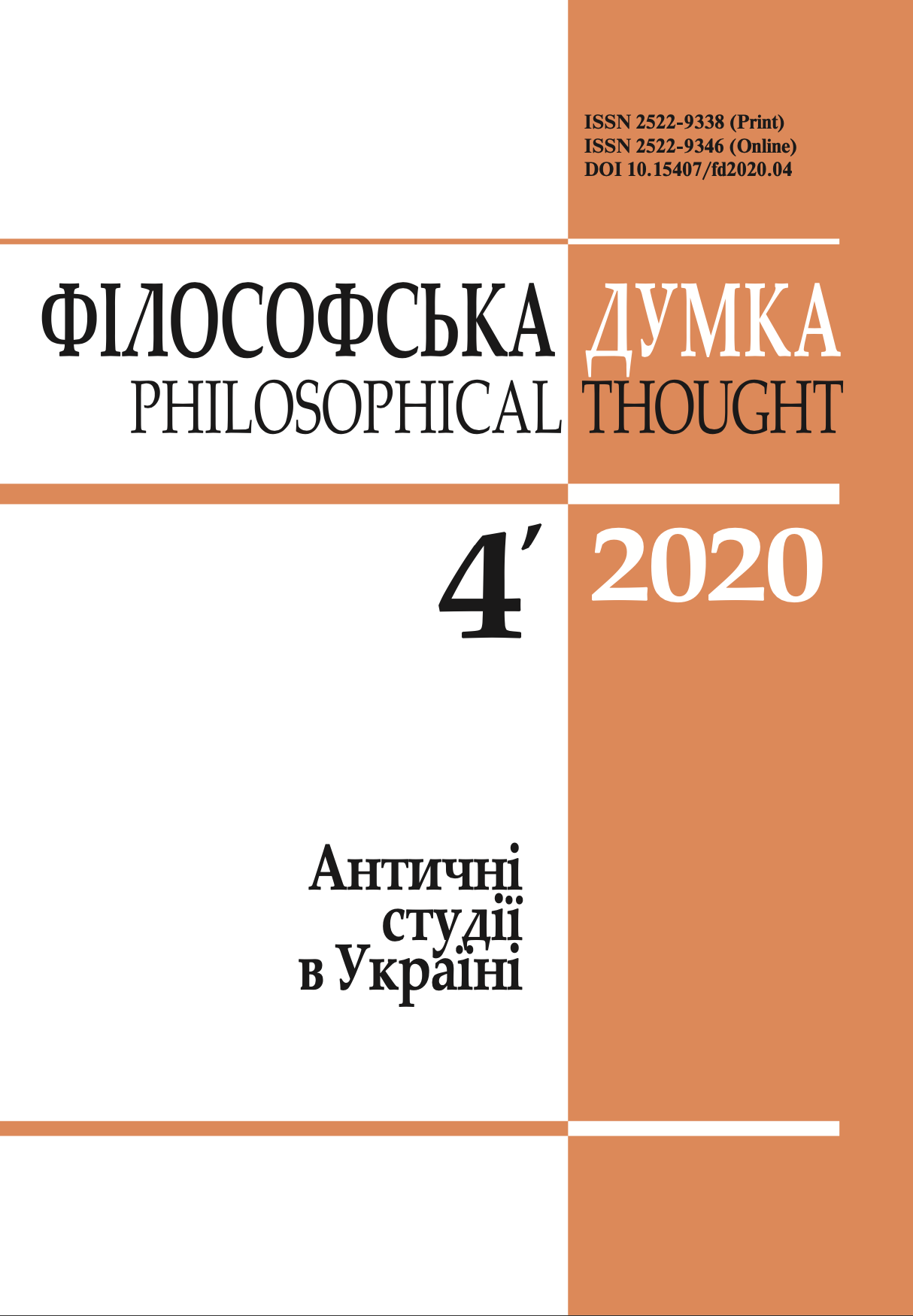CONTINUITY OF PHILOSOPHICAL TRADITONS: Antiquity and Modernity (based on Plato’s “Cratylus” and Proclus’ “Commentary on Cratylus”)
DOI:
https://doi.org/10.15407/fd2020.04.006Keywords:
theological system, epistemology, intellect, neoplatonism, being, translationAbstract
The phenomenon of language, being so familiar to us, still possesses unknown nature, origin, and, as we may say, function. For Plato, language was the way to cognition of the Universe. The phi- losophy of language, which was primarily initiated by Plato in his “Cratylus”, still has not ob- tained answers to the questions settled by great Greek thinker. In fact, it just acquired various solutions among different approaches during all four ages of understanding, namely Ancient, Scholastic, Modern and Post-modern periods. The article is supplemented with excerpts from the first Ukrainian translation of Proclus’ “Commentary on Plato’s “Cratylus”. The specifics of the style and vocabulary of the work is emphasized in the context of interpretation into Ukrainian. Historical and cultural context of Proclus’ works in general and particularly its “Commentaries” is addressed, and the main terminological system of his works is analyzed. Ukrainian equivalents are suggested. Some common features as well as discrepancies in Neoplatonist and Peripatetic approach are considered in the context of solutions to the same questions. Contrastive analysis of the “Commentary on Plato’s “Cratylus” with prior mythological context as well as with fol- lowing scholastic teaching is conducted in philosophical and linguistic aspects. The importance of problems placed by Plato in the field of epistemology and philosophy of language is addressed. Analogies with contemporary approach to linguistic and philosophical questions are considered in the scope of nativism and empiricism. Immutability of questions and mutability of generations and approaches is shown. The importance of previous works for the next development of con- temporary thought is emphasized.
References
Bos, E. (1992). On Proclus and his Influence in Medieval Philosophy. Leiden, New York. DOI: 10.1163/9789004320758
https://doi.org/10.1163/9789004320758
Chang Hah-Liang (2003). Is a language a primary modeling system? Sign System Studies, 31, 1-15.
Chlup, R. (2012). Proclus' polytheistic theology. Proclus: An Introduction, 112-136. Cambridge: Cambridge University Press. DOI: 10.1017/CBO9781139028042.005
https://doi.org/10.1017/CBO9781139028042.005
Chomsky, N. (2002). On Nature and Language. Cambridge: Cambridge University Press.
https://doi.org/10.1017/CBO9780511613876
Deely, J. (2001). Four Ages of Understanding. S.l.: University of Toronto Press.
https://doi.org/10.3138/9781442675032
Dodds, E. (1992). Proclus: The Elements of Theology. S.l.: Clarendon press.
Helmig, Ch.; Steel, C. (2015). Proclus. In: The Stanford Encyclopedia of Philosophy (Ed. by
E.N. Zalta). Retrieved from: https://plato.stanford.edu/archives/sum2015/entries/proclus/ Lewy, H. (2011). Chaldean Oracles and Theurgy: Mysticism, Magic and Platonism in the Later Roman Empire. Paris: Etudes Augustiniennes.
Maran, T. (2010). Why was Thomas A. Sebeok not a cognitive ethologist? Biosemiotics, 3(3), 315-329. DOI: 10.1007/s12304-010-9079-8
https://doi.org/10.1007/s12304-010-9079-8
Mariev, S. (2017). Bysantine Perspective on Neoplatonism. Berlin, Boston: De Gruyter. McNally, Th. (2017). Wittgenstein and the Philosophy of Language: The Legacy of the Philoso-
phical Investigations. Cambridge: Cambridge University Press. DOI: 10.1017/9781108181976 Peters, F. (1967). Greek Philosophical Terms: A Historical Lexicon. New York: NYU Press.
Plato (2017). Apology of Socrates. Dialogues (Tr. by Y. Kobiv, Yu. Mushak et al.). [In Ukrainian]. Kharkiv: Folio.
Plato (2018). Cratylus (427d-435е). [In Ukrainian]. Sententiae, 37(2), 108-140. DOI: 10.22240/sent37.02.108
https://doi.org/10.22240/sent37.02.108
Procli Diadochi (1908). Platonis Cratylum Commentaria (Ed. by G. Pasquali). Lipsiae. Retrieved from: https://archive.org/stream/proclidiadochii00pasqgoog#page/n19/mode/2up Proclus (1792). The Philosophical and Mathematical Commentaries (Tr. by T. Taylor). Retrieved from: https://play.google.com/books/reader?id=eJgfAQAAIAAJ&hl=en_GB&pg=GBS.
PP29
Proclus (2007). On Plato Cratylus (Tr. by B. Duvick). London: Bloomsbury.
Sebeok, Th.A.; Danesi, M. (2000). The Forms of Meaning: Modeling Systems Theory and Semiotic Analysis. Berlin: Mouton de Gruyter.
https://doi.org/10.1515/9783110816143
Sodomora, P. (2018). Language as a Way to Cognition (Plato's «Cratylus» in Ukrainian Translation). Sententiae, 37(2), 159-164. DOI: 10.22240/sent37.02.159
https://doi.org/10.22240/sent37.02.159
Sorabji, R.; Baltzly, D. (2006). Proclus: Commentary on Plato's Timaeus. Cambridge: Cambridge University Press.
Taylor, Th. (2016). Introduction to the Philosophy and Writings of Plato. S.l.: Kypros Press. Thomas of Aquino (2010). The Sum of Theology (Tr. by P. Sodomora) [In Ukrainian]. Lviv:
Spolom,
Westerink, L.G. (2011). Anonymous Prolegomena to Platonic Philosophy. Edited with Translation. In: Platonic Texts and Translations (vol. V). S.l.: Westbury.
Yermolenko, V. (2011). Orpheus, Dionysus and dreams of regeneration [In Ukrainian]. Filosofska Dumka, 4, 126-129.
Downloads
-
PDF (Українська)
Downloads: 268
Published
How to Cite
Issue
Section
License
Authors who publish with this journal agree to the following terms:
- Authors retain copyright and grant the journal right of first publication.
- Authors are able to enter into separate, additional contractual arrangements for the non-exclusive distribution of the journal's published version of the work (e.g., post it to an institutional repository or publish it in a book), with an acknowledgement of its initial publication in this journal.
- Authors are permitted and encouraged to post their work online (e.g., in institutional repositories or on their website) prior to and during the submission process, as it can lead to productive exchanges, as well as earlier and greater citation of published work (See The Effect of Open Access).


